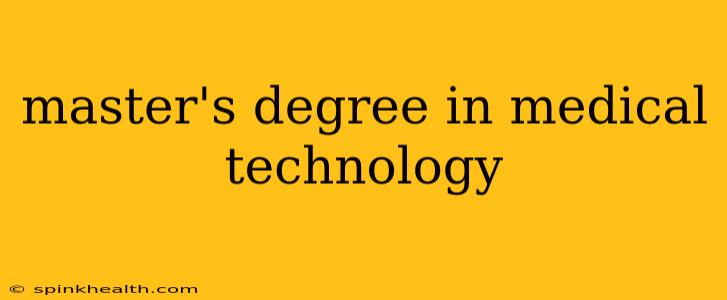Charting a Course to Success: A Master's Degree in Medical Technology
The world of healthcare is constantly evolving, demanding professionals who are not only knowledgeable but also adaptable and innovative. If you're passionate about the cutting edge of medical science and driven to make a real difference in patient care, a master's degree in medical technology might be the perfect path for you. But what exactly does it entail, and what doors will it open? Let's embark on a journey to explore this exciting field.
My name is Dr. Emily Carter, and for the last 15 years I've been working as a medical technologist and educator, witnessing firsthand the vital role these professionals play in healthcare. This isn't just a job; it's a calling demanding precision, critical thinking, and a deep understanding of both medical science and technology.
What is a Master's Degree in Medical Technology?
A Master of Science (MS) in Medical Technology, or a closely related degree like Biomedical Sciences with a focus on medical technology, provides advanced training in the analysis and interpretation of clinical laboratory data. It builds upon a bachelor's degree in medical technology or a related field, equipping graduates with highly specialized skills and in-depth knowledge. Think of it as the next level—taking your foundational understanding and honing it to a razor's edge of expertise.
This advanced training goes beyond the basics of blood tests and urinalysis. It delves into complex areas like molecular diagnostics, advanced instrumentation, quality control, and research methodologies. Graduates are prepared for leadership roles, advanced research opportunities, and positions requiring a deeper understanding of the intricate processes within a clinical laboratory.
What are the career paths after earning a master's degree in medical technology?
This is where the real excitement begins! A master's degree dramatically expands your career options. You're no longer just a medical technologist; you become a highly sought-after expert capable of:
- Leadership Roles: Many graduates step into supervisory positions, managing teams of medical technologists and overseeing laboratory operations.
- Research and Development: Your advanced skills make you a valuable asset in research settings, contributing to the development of new diagnostic techniques and technologies.
- Specialized Testing: Focus on areas like genomics, proteomics, or advanced immunology, becoming an expert in niche diagnostic testing.
- Regulatory Affairs: Ensure that clinical laboratories adhere to quality standards and regulations, playing a crucial role in maintaining patient safety.
- Education and Training: Share your expertise by becoming a medical technology educator or trainer, shaping the next generation of professionals.
What are the admission requirements for a master's degree in medical technology?
Admission requirements vary slightly depending on the university, but generally include:
- A bachelor's degree: Typically in medical technology, biology, chemistry, or a closely related field.
- A strong academic record: High GPA is usually required.
- GRE scores: Some programs may require GRE scores, though this is becoming less common.
- Letters of recommendation: From professors or supervisors who can attest to your abilities.
- Statement of purpose: Highlighting your career goals and why you're pursuing this degree.
How long does it take to complete a master's degree in medical technology?
Most master's programs in medical technology can be completed within 1-2 years of full-time study. Some programs offer flexible online options, allowing you to pursue your education while maintaining your current job.
What is the salary expectation after completing a master's degree in medical technology?
Salaries vary based on experience, location, and specialization. However, holding a master's degree typically translates to a higher starting salary and greater earning potential compared to those with only a bachelor's degree. The specialized skills and leadership potential fostered by this advanced degree position you for significant career advancement and financial reward.
Is a master's degree in medical technology worth it?
Absolutely! In a field as dynamic and crucial as healthcare, continuous learning and specialized skills are invaluable. A master's degree in medical technology provides you with the competitive edge needed to excel, lead, and make a significant impact on patient lives. It's an investment in your future – both personally and professionally. It’s a journey of continuous learning and growth, paving the way for a rewarding career at the forefront of medical innovation.

